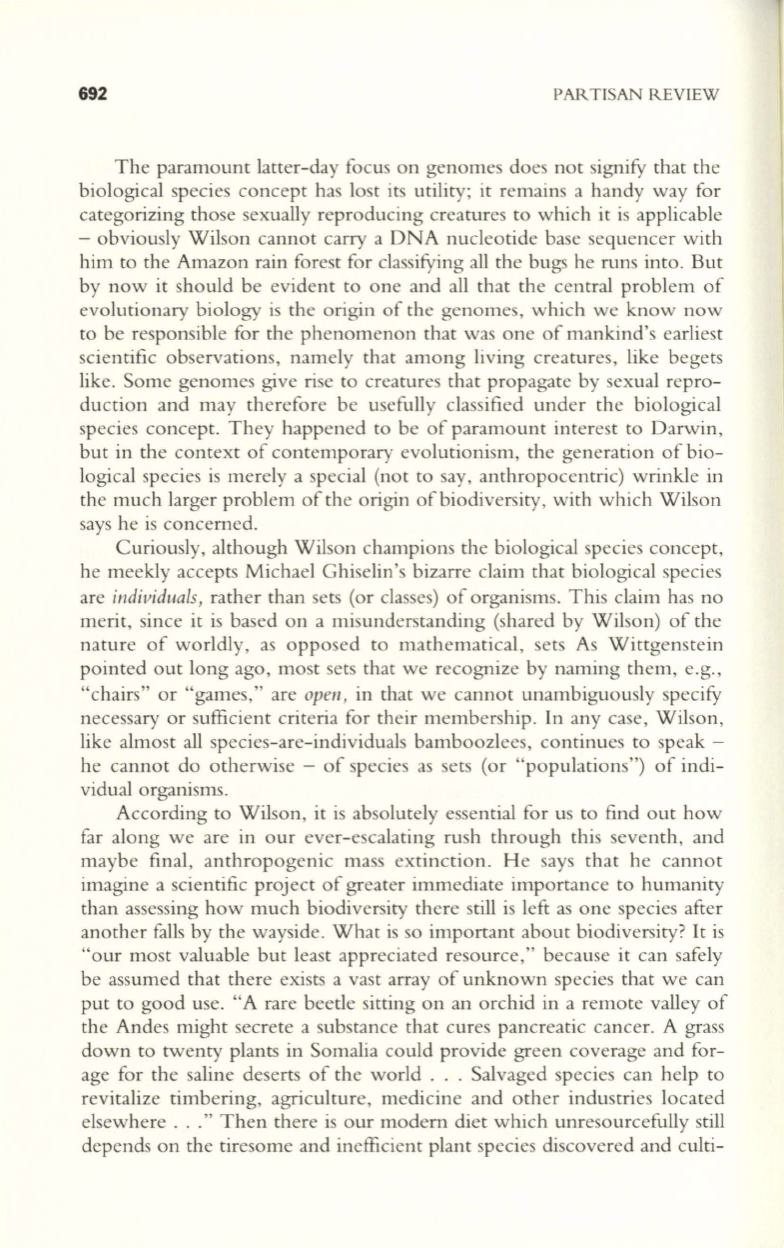
692
PARTISAN REVIEW
The paramount latter-day focus on genomes does not signifY that the
biological species concept has lost its utility; it remains a handy way for
categorizing those sexually reproducing creatures to which it is applicable
- obviously Wilson cannot carry a DNA nucleotide base sequencer with
him to the Amazon rain forest for classifYing all the bugs he runs into. But
by now it should be evident to one and all that the central problem of
evolutionary biology is the origin of the genomes, which we know now
to be responsible for the phenomenon that was one of mankind's earliest
scientific observations, namely that among living creatures, like begets
like. Some genomes give rise to creatures that propagate by sexual repro–
duction and may therefore be usefully classified under the biological
species concept. They happened to be of paramount interest to Darwin,
but in the context of contemporary evolutionism, the generation of bio–
logical species is merely a special (not to say, anthropocentric) wrinkle in
the much larger problem of the origin of biodiversity, with which Wilson
says he is concerned.
Curiously, although Wilson champions the biological species concept,
he meekly accepts Michael Ghiselin's bizarre claim that biological species
are
individuals,
rather than sets (or classes) of organisms. This claim has no
merit, since it is based on a misunderstanding (shared by Wilson) of the
nature of worldly, as opposed to mathematical , sets As Wittgenstein
pointed out long ago, most sets that we recognize by naming them, e.g.,
"chairs" or "games," are
open,
in that we cannot unambiguously specifY
necessary or sufficient criteria for their membership. In any case, Wilson,
like almost all species-are-individuals bamboozlees, continues to speak -
he cannot do otherwise - of species as sets (or "populations") of indi–
vidual organisms.
According to Wilson, it is absolutely essential for us to find out how
far along we are in our ever-escalating rush through this seventh, and
maybe final, anthropogenic mass extinction. He says that he cannot
imagine a scientific project of greater immediate importance to humanity
than assessing how much biodiversity there still is left as one species after
another falls by the wayside. What is so important about biodiversity?
It
is
"our most valuable but least appreciated resource," because it can safely
be assumed that there exists a vast array of unknown species that we can
put to good use. "A rare beetle sitting on an orchid in a remote valley of
the Andes might secrete a substance that cures pancreatic cancer. A grass
down to twenty plants in Somalia could provide green coverage and for–
age for the saline deserts of the world ... Salvaged species can help to
revitalize timbering, agriculture, medicine and other industries located
elsewhere . .. " Then there is our modern diet which unresourcefully still
depends on the tiresome and inefficient plant species discovered and culti-


